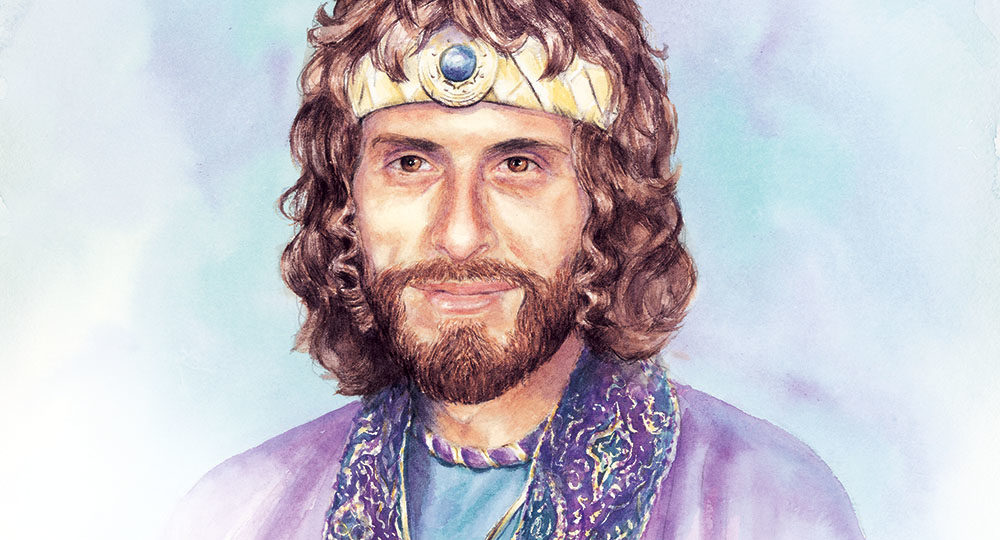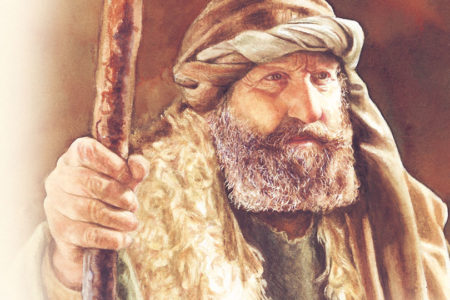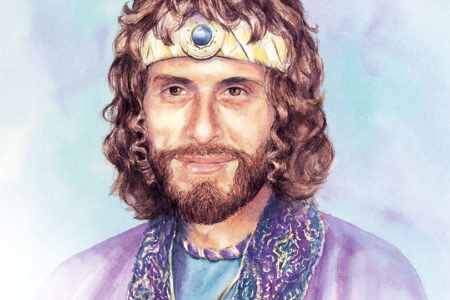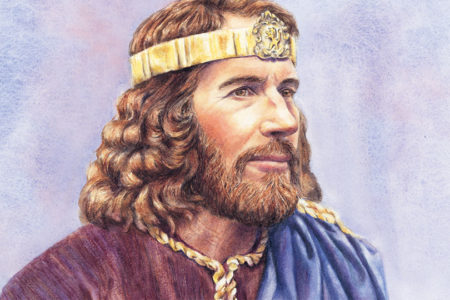Formed in the Master’s Hand
Agostino d’Antonio di Duccio, a 15th-century Italian sculptor, is said to have worked diligently but unsuccessfully on a large piece of marble. Other sculptors applied their skills to the same marble; but they, too, gave up. The stone was thrown in a rubbish heap where it remained for nearly forty years.
Then came Michelangelo Buonarroti. He saw the stone and had it brought to his studio. There he labored tirelessly to shape the image he had conceived in his head. He worked until it was finished. And from what was once a worthless slab of stone, Michelangelo carved one of the world’s greatest masterpieces—David.
A selected sketch from David’s life reveals how God, the true master sculptor, transformed a shepherd boy into Israel’s finest king. He lived by his prayer, “Teach me thy way, O LORD; I will walk in thy truth; unite my heart to fear thy name” (Ps. 86:11).
David was the youngest son of Jesse from the royal tribe of Judah. Ruth, the Moabitess, was his great-grandmother. One day Samuel the prophet arrived in the simple, hill town of Bethlehem with instructions from the Lord to anoint the next king. Not knowing which of Jesse’s sons God had chosen, the aged prophet performed a special ceremony in which seven of Jesse’s sons were presented to him. But none were chosen.
When Samuel asked, “Are all thy children here?” he learned that David, the youngest, was out in the fields watching the sheep (1 Sam. 16:11). So Samuel called for him. And when the ruddy-looking youth arrived, the Lord spoke and said, “Arise, anoint him; for this is he” (1 Sam. 16:12).
As Samuel poured the oil on David’s head, the Spirit of the Lord came on David. God often honors and blesses those whom the world views as insignificant. David later sang, “What is man, that thou art mindful of him? And the son of man, that thou visitest him?” (Ps. 8:4). Unlike those who discarded the marble stone, God saw in David the raw material of a godly king, a man truly after God’s own heart.
As a humble shepherd, David worked long, lonely hours. Yet it was time well spent in sacred reflection and meditation. During the warm summer nights, he slept under the open sky as he cared for the sheep. The canopy of brilliant stars before his eyes left him with a lasting impression of the majesty of God in creation: “The heavens declare the glory of God, and the firmament showeth his handiwork” (Ps. 19:1).
In winter, he no doubt rested in a tent or cave but always stayed near the flock in his care. David learned of God as the good and faithful Shepherd. As he cared for his father’s flock, so God cared for the people of His pasture. As he watched over the safety of the sheep, so God protected Israel. God had molded these essential attributes into David’s character early in life to create a pastoral disposition within the heart of the future king.
Ever watchful of danger as a shepherd, young David once killed a marauding lion and bear. This experience was David’s “boot camp” and prepared him for the gigantic challenge he was about to face.
As valiant Israelite warriors cowered in fear for forty days, a nine-foot-tall, heavily armored Philistine named Goliath of Gath challenged them, cursed them, and slandered God. So David accepted the giant’s challenge and knocked him out with one stone to the forehead. Then he lopped off the giant’s head. Some commentators suggest that David nailed the head on a gate in front of the Jebusite fortress (future Jerusalem) as notice to the inhabitants that one day he would claim the city for Israel (1 Sam. 17:54).
Undoubtedly, David had courage. However, he also had other qualities that were important in shaping the character of the future king. When he arrived at the battlefront and asked about the Philistine, his brothers falsely accused him of ambitious pride. His own family questioned his motives and intentions. Displaying meekness and patience, David turned aside his brother’s attack with a soft answer and went on with God’s business (1 Sam. 17:29–30).
David’s control over his emotions when falsely accused by those close to him was a moral triumph viewed more honorable than his battle with Goliath. The experience taught him to continue humbly with his task to the glory of God. Sometimes as a ruler, his only comfort would be in the sure presence and faithful trust of God. “The LORD is the strength of my life; of whom shall I be afraid?” (Ps. 27:1).
“Many are the afflictions of the righteous; but the LORD delivereth him out of them all” (Ps. 34:19). The Lord had given David much success against the Philistines. However, these triumphs brought trouble, which God used to test the substance of David’s heart.
King Saul was jealous. He knew the Lord had abandoned him and was with David. When David came to court to play his harp to soothe Saul’s troubled spirit, the king hurled a spear at him. Later Saul sent David on a campaign against the Philistines, hoping they would kill him. David triumphed and still submitted himself in respectful conduct toward his persecutor.
However, Saul’s jealousy increased; and David eventually fled from court. While hiding in a cave in the wilderness of En-gedi, David saw Saul enter the cave. It was an excellent opportunity to slay his enemy. Instead, David quietly crept up on him and cut a piece of cloth from his robe. A similar situation occurred later as Saul slept in an open field. Again David made no attempt to take Saul’s life. Even David’s own men urged him to slay Saul. One swift stroke of the sword and all of David’s problems could have been over. But David refused, saying, “I will not put forth mine hand against my lord; for he is the LORD’s anointed” (1 Sam. 24:10).
In displaying pity and godly restraint, David chose to be governed by the fear of God and to “rest in the LORD, and wait patiently for him” (Ps. 37:7). Despite Saul’s disobedience, he still was God’s choice to reign as long as he lived. David, indeed, had been promised the kingship; but he was not to advance the promise himself. The office of king was sacred. One day he would be king and would expect his subjects to recognize the sanctity of his position.
In fact, even the simple act of severing a section of Saul’s robe bothered his conscience. For David, it constituted a serious offense against royal dignity. It was difficult, but David patiently committed his way to the Lord, trusting God to bring all things to pass. The entire episode was a testimony to God, the master sculptor, who had carved a strong faith and sense of piety into the tender conscience of His David. Eventually Saul died in battle; and at age thirty, David became king over Judah, then over all of Israel (2 Sam. 5:4–5).
All earthly material chosen by sculptors has defects. As wonderful as David may have been, he was flawed with a sin nature. But David was not cast aside. Two incidents illustrate David’s faults. The first is among the best known in all of Scripture. While his troops were on a military campaign, David stayed home. Looking down from his roof, he was struck by the beauty of a married woman named Bath-sheba. Unfortunately, he succumbed to his sinful desire and sent for her. Bathsheba conceived. After trying unsuccessfully to cover up his sin, David had her husband killed in battle; and he married Bath-sheba. A year passed. But what David had done in darkness would be brought to light.
To arouse him from his yearlong spiritual stupor, God sent Nathan the prophet to confront the king. David could have offered excuses or made light of his sin. But he did not. He repented. Psalm 32 describes his agonized soul, and Psalm 51 is his confession. God cut deep into David’s soul to show him that “he that covereth his sins shall not prosper” (Prov. 28:13).
The other incident was when David took a census without God’s authorization (2 Sam. 24). Some scholars suggest that David’s many successes over his enemies made him prideful. If so, then David’s many blessings turned into a snare, producing a complacent and self-sufficient attitude. David acknowledged his sin (2 Sam. 24:17). But the penalty was high. Seventy thousand people were slain with a plague. In the end, the sharp chisel of divine judgment forged a man who was ever grateful for the infinite depths of mercy and the super-abounding grace of God.
“For I have kept the ways of the LORD” (Ps. 18:21) was David’s testimony. When he first became king, his reign was over Judah only. Then, after much political intrigue and violence, he reigned over all Israel. To consolidate his reign, he captured the old Jebusite fortress and made it the new capital of the united kingdom. The city was renamed the “City of David.”
In general, David displayed great organizational skills in civil affairs. Moreover, despite all his fame and prosperity, he still maintained the true substance of a godly man—his spirituality. More than anything, David wanted to build a temple to honor God. This privilege was denied him for he was a man of war. But David was not bitter. He entered the Tabernacle and, before the Ark, in genuine humility, offered God adoration and praise (2 Sam. 7:18–29).
Though David never lived to see the Temple his son would build, he devoted his later life to preparing the materials for its construction. Through the prophet Nathan, God encouraged David’s spiritual aspirations and told David He would build him a spiritual house that would last forever. It consisted of an eternal house, kingdom, and throne (2 Sam. 7:16). The full culmination of the promise was realized in King David’s greater son, Jesus the Messiah (Lk. 1:32–33).
Today the achievement of Michelangelo’s gigantic marble sculpture of David is on display in Florence, Italy. It is a tribute to a great, human artist.
Yet, as the Master Sculptor of character, God molded a humble shepherd into a kingly, compassionate statesman; forged a sweet singer into a sensitive but fierce soldier; and chiseled through an ever-present sinful nature to produce a spiritual man. In Israel today, people still sing, “David melech Yisrael, chai chai,” which means, “David, king of Israel, is alive, is alive.” God’s masterpiece is always on display in Scripture. He is a tribute to a great God.







